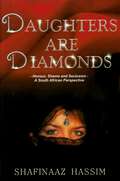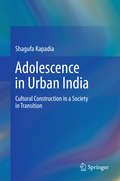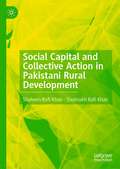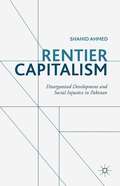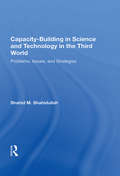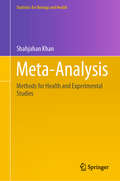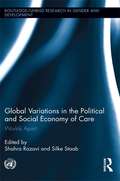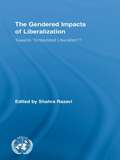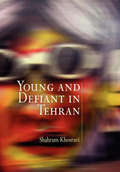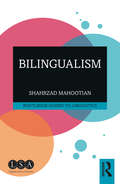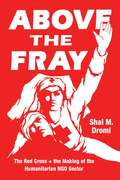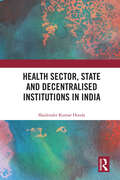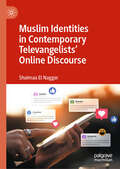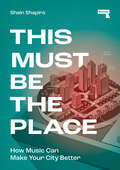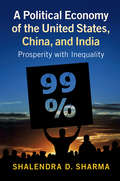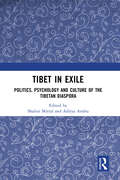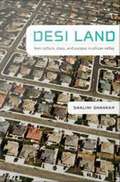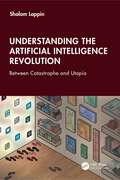- Table View
- List View
DAUGHTERS ARE DIAMONDS
by Shafinaaz HassimDaughters are Diamonds is a ground breaking treatise on the objectification of women in honour-bound sectors of society. As a study, it sets out to define these questions: How are the opportunities, challenges and obstacles facing South African Indian Muslim women within the family, perceived and experienced by the individual? To what extent, if at all, does traditionalist culture create/influence a gap between opportunity and achievement for South African Indian Muslim women? The statement that "women are diamonds" is often used by Indian Muslim traditionalists to justify the abject seclusion of women. In this view, that which is valuable should be hidden in safekeeping. The metaphor of the diamond is used to illustrate the objectification of daughters borne of honour-bound societies, and the limits put to the administration of their lives, in keeping with the code of honour. This study is a comment on the notion that, in keeping with this honour code, there is a fine line between maintaining the dignity of a people and infringing on the rights of the individual. It also asks whether women are able to carve out a space for themselves within which a fully reflexive life may be lived in spite of the restrictions placed on them.
Adolescence in Urban India: Cultural Construction in a Society in Transition
by Shagufa KapadiaSet against the backdrop of social change and globalization, this book presents the contents and contours of adolescence in contemporary urban India. Based on the trends derived from a series of mixed-method studies with adolescent girls and boys, and parents from urban upper middle class families, it explores adolescents' and parents' interpretations of the stage of adolescence, illustrates views on parenting, and discusses approaches to interpersonal disagreements to derive a framework of the parent-adolescent relationship. Drawing from the cultural-contextual perspective of human development, the book in its essence offers a culturally and contextually sensitive model of adolescence that is shaped along the central tenets of family interdependence, harmony, and sensitivity to parental concerns. Highlighted as well are aspects that have remained mostly unexplored, for example, adolescents' capacity for empathy and perspective taking, and emerging issues of autonomy in a primarily relational culture. At a broader level, the book reflects upon the interplay of cultural continuity and change, and contributes to an understanding of globalizing influences on human development. Overall, the depiction of adolescent development captured in the book has significant implications for enhancing family relationships and fostering self-growth---elements that are crucial for positive youth development. The book will be of immense use to scholars in human development, psychology, and allied fields as well as to practitioners who work with adolescents.
Social Capital and Collective Action in Pakistani Rural Development
by Shahrukh Rafi Khan Shaheen Rafi KhanThis book distinguishes conceptually between indigenous and constructed social capital and the associated spontaneous and induced collective action for rural development and natural resource preservation. While some of the case studies in this book show that induced collective action can lead to cost-effective, community-centric and empirically grounded rural development initiatives, other case studies show that spontaneous collective action, based on indigenous social capital, can result in resource preservation, positive development outcomes, and resistance to the excesses engendered by conventional development. The authors also explore a hybrid form whereby spontaneous collective action is given a more effective and sustainable shape by an outside organization with experience of induced collective action. Exploring alternative community-centric paths to development, especially those attuned with sustainability imperatives, is part of a global search for solutions. While the volume draws on the Pakistani case, the problem with conventional development approaches and the need for complementary alternatives is not unique to only this country; and the volume has broader relevance to students and researchers across the fields of social policy and development.
Rentier Capitalism: Disorganised Development and Social Injustice in Pakistan
by Shahid AhmedSince the early 1950s East Asia (China, Taiwan and South Korea) and South-East Asia (Indonesia, Malaysia, Thailand and Vietnam) have, despite war and other challenges, managed to transform the lives of their people, whereas South Asia (India, Pakistan, Bangladesh and Sri Lanka) has lagged behind. The success of East and South-East Asia has not been accidental – it has been driven by action to reduce rural poverty, by the provision of decent education and health services to the people, and by high quality physical and institutional infrastructure, such as roads, ports and railways, and targeted support from the State to develop particular industries. In contrast, Pakistan has never confronted the problem of rural poverty, nor invested in public services. This failure is a reflection of the power of the landed class and its urban allies. This has now taken the form of widespread rent-seeking in the economy with the country's ruling elite sharing out the spoils amongst themselves rather than taking measures to grow the size of the economy so that all might share in the resulting prosperity.
Capacity-building In Science And Technology In The Third World: Problems, Issues, And Strategies
by Shahid M. ShahidullahTraditional strategies of technical assistance, technology transfer, appropriate technology, and self-reliance for science and technology development in the Third World, cannot be successfully implemented until Third World countries improve their fundamental organization of science and technology. In order to make those improvements - a process kno
Meta-Analysis: Methods for Health and Experimental Studies (Statistics for Biology and Health)
by Shahjahan KhanThis book focuses on performing hands-on meta-analysis using MetaXL, a free add-on to MS Excel. The illustrative examples are taken mainly from medical and health sciences studies, but the generic methods can be used to perform meta-analysis on data from any other discipline. The book adopts a step-by-step approach to perform meta-analyses and interpret the results. Stata codes for meta-analyses are also provided. All popularly used meta-analytic methods and models – such as the fixed effect model, random effects model, inverse variance heterogeneity model, and quality effect model – are used to find the confidence interval for the effect size measure of independent primary studies and the pooled study. In addition to the commonly used meta-analytic methods for various effect size measures, the book includes special topics such as meta-regression, dose-response meta-analysis, and publication bias. The main attraction for readers is the book’s simplicity and straightforwardness in conducting actual meta-analysis using MetaXL. Researchers would easily find everything on meta-analysis of any particular effect size in one specific chapter once they could determine the underlying effect measure. Readers will be able to see the results under different models and also will be able to select the correct model to obtain accurate results.
Ecological Modernisation and Environmental Compliance: The Garments Industry in Bangladesh
by Shahpar SelimEconomic development that is environmentally, socially and ethically sound is at the forefront of contemporary debates all over the world. This is especially relevant to international trade where goods manufactured in least developed countries (LDCs) are being exported to developed countries (DCs) via international supply chains. This book looks at Bangladesh’s ready-made garments (RMG) industry – the seventh largest in the world — facing demands for environmental and social management according to standards set by consumers in environmentally progressive societies. Apart from these concerns not having found cultural or institutional resonance in Bangladesh, the pressures for cost reduction, on-time delivery and cheap labour in a highly competitive international market make the problem that much more complex. In this book Selim uses the analytical framework provided by the ecological modernisation theory to examine the economic, communicative and social political aspects of ethical trade, and argues that the economy-ecology relationship can indeed be a positive sum game if nation-states and economic actors change their policymaking styles and greening behaviour to take advantage of scientific evidence and green technological opportunities.
Global Variations in the Political and Social Economy of Care: Worlds Apart (Routledge/UNRISD Research in Gender and Development)
by Shahra Razavi Silke StaabCare work, both paid and unpaid, contributes to well-being, social development and economic growth. But the costs of providing care are unequally borne across gender and social class. Feminist scholarship on the gendered construction of welfare provisioning and welfare regimes has produced a conceptually strong and empirically grounded analysis of care, reinforcing the necessity of rethinking the distinctions between "the public" and "the private" as well as the links between them. Yet this analysis, premised on post-industrial contexts, does not travel easily to other parts of the world. Many of its core assumptions – about family structures, labor markets, state capacities, and public social provisioning – do not hold for a wider range of countries. Drawing on original research on the care economy in three developing regions (Africa, Asia, Latin America), this volume addresses a major empirical lacuna while facilitating a conversation across the North-South divide.
The Gendered Impacts of Liberalization: Towards "Embedded Liberalism"? (Routledge/UNRISD Research in Gender and Development)
by Shahra RazaviIn the last two decades public policies have reflected a drive for accelerated global economic integration ("globalization"), associated with greater economic liberalization. The outcomes have been largely disappointing, even in the estimate of their designers. Rural livelihoods have become more insecure, and the expected growth has rarely materialized. Insecurity is also etched into the growth of informal economies across the world. Yet the economic policy agenda that has been so adverse to many people around the world has also provided new opportunities to some social groups, including some low-income women. In response to widespread discontent with the liberalization agenda, more attention is now being given to social policies and governance issues, viewed as necessary if globalization is to be "tamed" and "embedded". The contributors to this volume address key issues and questions such as whether states have the capacity to remedy the social distress unleashed by liberalization in the absence of any major revision of their macroeconomic policies and whether the proposed social policy reforms can redress gender-based inequalities in access to resources and power.
Precarious Lives: Waiting and Hope in Iran
by Shahram KhosraviIn Precarious Lives, Shahram Khosravi attempts to reconcile the paradoxes of Iranians' everyday life in the first decade of the twenty-first century. On the one hand, multiple circumstances of precarity give rise to a sense of hopelessness, shared visions of a futureless tomorrow, widespread home(land)lessness, intense individualism, and a growth of incivilities. On the other, daydreaming and hope, as well as civility and solidarity in political protests, street carnivals, and social movements, continue to persist. Young Iranians describe themselves as being stuck in purposelessness and forced to endure endless waiting, and they are also aware that they are perceived as unproductive and a burden on their society. Despite the aspirations and inspiration they possess, they find themselves forced into petrifying social and spatial immobility. Uncertainty in the present, a seemingly futureless tomorrow: these are the circumstances that Khosravi explores in Precarious Lives.Creating an intricate and moving portrait of contemporary Iranian life, Khosravi weaves together individual stories, government reports, statistics, and cultural analysis of art and literature to depict how Iranians react to the experience of precarity and the possibility of hope. Drawing on extensive ethnographic engagement with youth in Tehran and Isfahan as well as with migrant workers in rural areas, Khosravi examines the complexities and contradictions of everyday life in Iran. Precarious Lives is a vital work of contemporary anthropology that serves as a testament to the shared hardship and hope of the Iranian people.
Young and Defiant in Tehran
by Shahram KhosraviWith more than half its population under twenty years old, Iran is one of the world's most youthful nations. The Iranian state characterizes its youth population in two ways: as a homogeneous mass, "an army of twenty millions" devoted to the Revolution, and as alienated, inauthentic, Westernized consumers who constitute a threat to the society. Much of the focus of the Islamic regime has been on ways to protect Iranian young people from moral hazards and to prevent them from providing a gateway for cultural invasion from the West. Iranian authorities express their anxieties through campaigns that target the young generation and its lifestyle and have led to the criminalization of many of the behaviors that make up youth culture.In this ethnography of contemporary youth culture in Iran's capital, Shahram Khosravi examines how young Tehranis struggle for identity in the battle over the right to self-expression. Khosravi looks closely at the strictures confronting Iranian youth and the ways transnational cultural influences penetrate and flourish. Focusing on gathering places such as shopping centers and coffee shops, Khosravi examines the practices of everyday life through which young Tehranis demonstrate defiance against the official culture and parental dominance. In addition to being sites of opposition, Khosravi argues, these alternative spaces serve as creative centers for expression and, above all, imagination. His analysis reveals the transformative power these spaces have and how they enable young Iranians to develop their own culture as well as individual and generational identities. The text is enriched by examples from literature and cinema and by livid reports from the author's fieldwork.
Bilingualism (Routledge Guides to Linguistics)
by Shahrzad MahootianBilingualism provides a concise and lively introduction to bilingualism as a social and linguistic phenomenon and explains its impact on individuals and on society. Addressing questions such as what it means to be bilingual, how one becomes bilingual, and how exposure to more than one language can hinder or enhance a child’s cognitive development, this book features: an introduction to the linguistic, sociolinguistic, and cognitive outcomes of bilingualism, including bilingual language acquisition, the grammar of language-mixing, the link between language choice and identity, and the value of maintaining and promoting bilingualism; up-to-date overviews of the prominent concerns and facts about bilingualism; activities and discussion questions which invite readers to consider their own perspectives on bilingualism and how it manifests in their own lives and communities; links to relevant videos and suggested further reading, including topical novels, short stories, and essays. Aimed at students with no background in linguistics, this book is essential reading for anyone studying bilingualism for the first time.
Contemporary Alternative Spiritualities in Israel (Palgrave Studies in New Religions and Alternative Spiritualities)
by Shai Feraro and James R. LewisThis volume is the first English-language anthology to engage with the fascinating phenomena of recent surges in New Age and alternative spiritualties in Israel. Contributors investigate how these New Age religions and other spiritualties—produced in Western countries within predominantly Protestant or secular cultures–transform and adapt themselves in Israel. The volume focuses on a variety of groups and movements, such as Theosophy and Anthroposophy, Neopaganism, Channeling, Women’s Yoga, the New Age festival scene, and even Pentecostal churches among African labor migrants living in Tel Aviv. Chapters also explore more Jewish-oriented practices such as Neo-Kabballah, Neo-Hassidism, and alternative marriage ceremonies, as well as the use of spiritual care providers in Israeli hospitals. In addition, contributors take a close look at the state’s reaction to the recent activities and growth of new religious movements.
The Modern Art of Dying: A History of Euthanasia in the United States
by Shai J. LaviHow we die reveals much about how we live. In this provocative book, Shai Lavi traces the history of euthanasia in the United States to show how changing attitudes toward death reflect new and troubling ways of experiencing pain, hope, and freedom. Lavi begins with the historical meaning of euthanasia as signifying an "easeful death." Over time, he shows, the term came to mean a death blessed by the grace of God, and later, medical hastening of death. Lavi illustrates these changes with compelling accounts of changes at the deathbed. He takes us from early nineteenth-century deathbeds governed by religion through the medicalization of death with the physician presiding over the deathbed, to the legalization of physician-assisted suicide. Unlike previous books, which have focused on law and technique as explanations for the rise of euthanasia, this book asks why law and technique have come to play such a central role in the way we die. What is at stake in the modern way of dying is not human progress, but rather a fundamental change in the way we experience life in the face of death, Lavi argues. In attempting to gain control over death, he maintains, we may unintentionally have ceded control to policy makers and bio-scientific enterprises.
Above the Fray: The Red Cross and the Making of the Humanitarian NGO Sector
by Shai M. DromiFrom Lake Chad to Iraq, nongovernmental organizations (NGOs) provide relief around the globe, and their scope is growing every year. Policymakers and activists often assume that humanitarian aid is best provided by these organizations, which are generally seen as impartial and neutral. In Above the Fray, Shai M. Dromi investigates why the international community overwhelmingly trusts humanitarian NGOs by looking at the historical development of their culture. With a particular focus on the Red Cross, Dromi reveals that NGOs arose because of the efforts of orthodox Calvinists, demonstrating for the first time the origins of the unusual moral culture that has supported NGOs for the past 150 years. Drawing on archival research, Dromi traces the genesis of the Red Cross to a Calvinist movement working in mid-nineteenth-century Geneva. He shows how global humanitarian policies emerged from the Red Cross founding members’ faith that an international volunteer program not beholden to the state was the only ethical way to provide relief to victims of armed conflict. By illustrating how Calvinism shaped the humanitarian field, Dromi argues for the key role belief systems play in establishing social fields and institutions. Ultimately, Dromi shows the immeasurable social good that NGOs have achieved, but also points to their limitations and suggests that alternative models of humanitarian relief need to be considered.
The Other Global City (Routledge Advances in Geography)
by Shail MayaramWhat is a Global City? Who authorizes the World Class City? This edited volume interrogates the "global cities" literature, which views the city as a shimmering, financial "global network." Through a historical-ethnographic exploration of inter-ethnic relations in the "other global" cities of Cairo, Beirut, Istanbul, Bukhara, Lhasa, Delhi, Singapore, Kuala Lumpur and Tokyo, the well-known contributors highlight cartographies of the Other Global City. The volume contends that thinking about the city in the longue duree and as part of a topography of interconnected regions contests both imperial and nationalist ways of reading cities that have occasioned the many and particularly violent territorial partitions in Asia and the world.
Health Sector, State and Decentralised Institutions in India
by Shailender Kumar HoodaThis book describes the transition in Indian healthcare system since independence and contributes to the ongoing debate within development and institutional economics on the approaches towards reform in the public health system. The institutional reform perspective focuses on examining the effective utilisation of allotted resources and improvements in delivery through decentralisation in governance by ensuring higher participation of elected governments and local communities in politics, policymaking and delivery of health services. It discusses the economic (resource) reforms to explain the relevance and expansion of state interventionism along with its influence on the health sector, accountability and allocative efficiency. The author also explores the connections between neoliberal thought and privatisation in health sector, and examines the greater role of insurance-based financing and their implications for health service access and delivery. The book offers ways to address long-standing systemic and structural problems that confront the Indian healthcare system. Based on large-scale surveys and diverse empirical data on the Indian economy, this book will be of great interest to researchers, students and teachers of health economics, governance and institutional economics, political economy, sociology, public policy, regional studies and development studies. This will be useful to policymakers, health economists, social scientists, public health experts and professionals, and government and nongovernment institutions.
Sexuality Reimagined: MSM in Modern India
by Shailja TandonThe book examines how medical knowledge is produced around bodies that do not fit in the heteronormative framework of the state’s rationale and processes. The marginal bodies studied in this research are termed MSM, men who have sex with men, categorized as a high-risk group in the backdrop of HIV/AIDS. These Queer bodies entered the registers of epidemiology and governmentality. This classification is the point of departure for the book. The book interrogates and asks how does a sexual subject become a political question? To answer this political trajectory, the book analyses the category of risk in biomedicine. It investigates how the category of risk becomes critical to the Indian state’s rationale and policies wherein, through the ambit of health and population, sexuality is managed. Unearthing the sexual politics in South Asia, the book, based on rich empirical evidence derived from the lived experiences of MSM, narrates the construction of sexual subjectivity and masculinity. The process of construction occurs in negotiation with the Indian state, bringing forth the dimension of the Indian state as a medico-legal governmentality regime and how MSM takes on the identity of a medicalized subject.
Muslim Identities in Contemporary Televangelists' Online Discourse
by Shaimaa El NaggarThis book examines the discourse of Muslim televangelism in the West, particularly looking at the emergence of 'home-grown' televangelists who grew up in the West and deliver their sermons in English, addressing audiences in contexts such as the UK and the USA. In their sermons, televangelists address topics that are relevant to the everyday life of Muslims and Muslim youth such as friendship, marriage and the misrepresentation of Islam/Muslims in mass media. This book explores contemporary Muslim televangelism and its manifestations in other forms of digital religion, including YouTube, websites and social media which mediate religious content. Using a Critical Discourse Studies approach, the author explores the power structures underpinning the popularity of Muslim televangelism, investigates the linguistic strategies used by Muslim televangelists to construct their identities online, and analyses how Islam and Muslims are represented in their sermons. This book will be of interest to religious studies, media studies, and discourse studies scholars, and to anyone interested in the topic of Islam/Muslims in the West in the contemporary age.
This Must Be the Place: How Music Can Make Your City Better
by Shain ShapiroThis Must Be the Place explores how music can make cities better.This Must Be the Place introduces and examines music&’s relationship to cities. Not the influence cities have on music, but the powerful impact music can have on how cities are developed, built, managed and governed.Told in an accessible way through personal stories from cities around the world — including London, Melbourne, Nashville, Austin and Zurich — This Must Be the Place takes a truly global perspective on the ways music is integral to everyday life but neglected in public policy.Arguing for the transformative role of artists and musicians in a post-pandemic world, This Must Be The Place not only examines the powerful impact music can have on our cities, but also serves as a how-to guide and toolkit for music-lovers, artists and activists everywhere to begin the process of reinventing the communities they live in.
A Political Economy of the United States, China, and India: Prosperity With Inequality
by Shalendra D. SharmaThe precipitous rise in global and national economic inequality, which the inexorable force of globalization promised to address with affluence and abundance for all, has returned with a vengeance. The problem of worsening socioeconomic inequality and how best to ameliorate this pernicious resurgence occupies center stage of national and international politics. This study investigates the coexistence of high rates of economic growth and unparalleled prosperity (including a review of the decline in poverty levels in China and India and many other developing countries) with rises in income and wealth inequality in the United States, China, and India.<P><P> This book examines the overall effectiveness of the measures taken by these three countries to address such anomalies, and what they should do to tackle the problem of widening inequality. This study breaks new ground by providing an original comparative analysis of the challenges facing the world's three major economies.<P> Addresses why both democratic and authoritarian governance have failed to promote more equitable development.<P> Provides nuanced insights into the roots of inequality crises.<P> Offers solutions to address global economic inequality.
Tibet in Exile: Politics, Psychology and Culture of the Tibetan Diaspora
by Shalini MittalThis book delves deep into the lived experiences of the Tibetan diaspora, offering an insightful exploration through the intersecting lenses of politics, psychology, and culture. Drawing from the expertise of scholars in fields such as political science, sociology, psychology, and cultural studies, the book provides a rich, multidisciplinary analysis that reveals the complexities of Tibetan life in exile. It meticulously examines the delicate diplomacy between the Tibetan government-in-exile and host nations, unraveling the intricate political dynamics that shape the aspirations and challenges faced by Tibetans abroad. In addition to political analysis, the book sheds light on the psychological resilience and cultural innovation within the Tibetan community. Through an exploration of art, music, literature, and religious practices, it uncovers how Tibetans have creatively reimagined and redefined their cultural identity in the face of displacement and adversity. This volume is an essential resource for students, researchers, and educators in anthropology, political science, sociology, psychology, and cultural studies. It also serves as a valuable tool for policymakers, advocates, and activists engaged in issues of diaspora, migration, human rights, and social justice. For anyone seeking to understand the profound impact of exile, the endurance of cultural identity, and the strength of community, this book is a must-read. This version aims to be more engaging while clearly defining the book’s scope, relevance, and target audience.
Theorizing Fieldwork in the Humanities: Methods, Reflections, and Approaches to the Global South
by Shalini Puri and Debra A. CastilloThis volume, the first of its kind, launches a conversation amongst humanities scholars doing fieldwork on the global south. It both offers indispensable tools and demonstrates the value of such work inside and outside of the academy. The contributors reflect upon their experiences of fieldwork, the methods they improvised, their dilemmas and insights, and the ways in which fieldwork shifted their frames of analysis. They explore how to make fieldwork legible to their disciplines and how fieldwork might extend the work of the humanities. The volume is for both those who are already deeply immersed in fieldwork in the humanities and those who are seeking ways to undertake it.
Desi Land: Teen Culture, Class, and Success in Silicon Valley
by Shalini ShankarDesi Land is Shalini Shankar's lively ethnographic account of South Asian American teen culture during the Silicon Valley dot-com boom. Shankar focuses on how South Asian Americans, or "Desis," define and manage what it means to be successful in a place brimming with the promise of technology. Between 1999 and 2001 Shankar spent many months "kickin' it" with Desi teenagers at three Silicon Valley high schools, and she has since followed their lives and stories. The diverse high-school students who populate Desi Land are Muslims, Hindus, Christians, and Sikhs, from South Asia and other locations; they include first- to fourth-generation immigrants whose parents' careers vary from assembly-line workers to engineers and CEOs. By analyzing how Desi teens' conceptions and realizations of success are influenced by community values, cultural practices, language use, and material culture, she offers a nuanced portrait of diasporic formations in a transforming urban region. Whether discussing instant messaging or arranged marriages, Desi bling or the pressures of the model minority myth, Shankar foregrounds the teens' voices, perspectives, and stories. She investigates how Desi teens interact with dialogue and songs from Bollywood films as well as how they use their heritage language in ways that inform local meanings of ethnicity while they also connect to a broader South Asian diasporic consciousness. She analyzes how teens negotiate rules about dating and reconcile them with their longer-term desire to become adult members of their communities. In Desi Land Shankar not only shows how Desi teens of different socioeconomic backgrounds are differently able to succeed in Silicon Valley schools and economies but also how such variance affects meanings of race, class, and community for South Asian Americans.
Understanding the Artificial Intelligence Revolution: Between Catastrophe and Utopia
by Shalom LappinAfter many years during which it languished in relative obscurity, in remote classrooms of computer science departments and in small prototype projects for tech companies, artificial intelligence (AI) is now a searingly hot topic across the media. Yet much of the public discussion is so feverish that an understanding of the basic scientific and engineering elements of the field is easily lost, often resulting in exaggerated claims, as well as dangerously neglected threats.This concise and sober book presents a brief history of AI, explaining in clear language the central engineering innovations that have produced the current revolution. It distinguishes between imagined dangers and the very real problems that AI is creating. Spread across seven short and accessible chapters, this book explains the developments behind deep learning and the applications of deep neural networks (DNNs). It addresses both the imagined and actual risks posed by the AI revolution, before outlining the elements of a rational public policy on AI, covering topics like tech monopolies, disinformation, bias, hate speech, intellectual property rights, and inequality.Suitable for the general reader, Understanding the Artificial Intelligence Revolution: Between Catastrophe and Utopia is the ideal book for anyone seeking a clear and informed introduction to AI.
